
President Donald Trump has taken to harshly targeting language towards Iran. He alleges that the country spends its oil wealth to pay for terrorist networks across the Middle East. His recent remarks spotlight a decades-long policy of unilateral economic sanctions. These sanctions specifically target Iran’s oil exports and are just the latest step in a larger “maximum pressure” campaign that started when he took office.
Since taking office, President Trump has made it a priority to weaken Iran’s economic power, especially targeting the country’s oil sector. This campaign accountably deflects blame by downplaying the goal of bringing Iran’s oil exports to zero. These exports are a crucial part of the funding stream for most, if not all, militant groups in the Middle East. Unfortunately, this week, Trump kinda went there with a pretty clear warning shot. He announced that any nation or person purchasing oil or petrochemical products from Iran will be subject to “severe consequences.”
“Any country or person who buys ANY AMOUNT of OIL or PETROCHEMICALS from Iran will be subject to, immediately, Secondary Sanctions,” Trump stated during a press conference. He argued that these sanctions would impose enormous burdens on any entity that wanted to do business with the United States.
Diplomatic Tension and Nuclear Concerns
Aside from these unilateral sanctions, President Trump is negotiating with Iran to limit its nuclear program. This diplomatic push would seek to diffuse fears over Iran’s growing nuclear capabilities, while doubling down on the economic pressure that has built up since 2012. Trump’s recent declarations suggest that his administration will not ease sanctions until Iran significantly alters its behavior on multiple fronts.
Trump’s strong rhetoric highlights a zero-tolerance approach toward any international dealings that could potentially strengthen Iran’s economic position. “They will not be allowed to do business with the United States of America in any way, shape, or form,” he asserted, emphasizing the consequences for countries that defy U.S. sanctions.
The ongoing tensions between the U.S. and Iran reflect broader geopolitical conflicts and concerns about regional stability. As Trump continues to advocate for stringent measures against Iran, the international community watches closely to gauge the potential impacts on global oil markets and diplomatic relations.
What The Author Thinks
The Trump administration’s aggressive sanctions and high-stakes diplomacy are shaping a fraught geopolitical environment. While the strategy of economic pressure aims to curb Iran’s activities, it risks further destabilizing the region and pushing Iran to the brink, potentially leading to unintended consequences in the global oil market and international relations.
Featured image credit: FMT
Follow us for more breaking news on DMR
